Health Sciences and BIO5 Teams Creating Thousands of COVID-19 Sample Collection Kits to Offset Statewide Shortage
College of Medicine – Tucson and BIO5 scientists quickly respond so Arizona health care providers can increase testing.
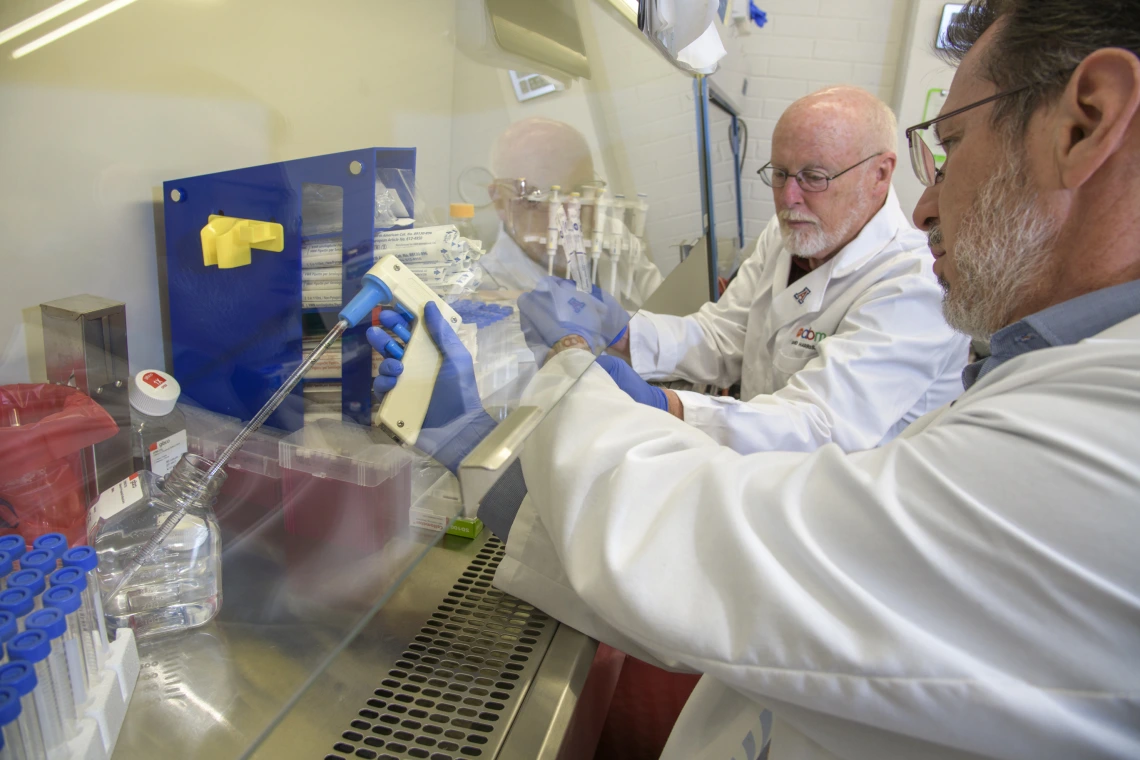
David Harris, PhD, MS, director of the University of Arizona Biorepository, and Michael Bawdowski, PhD, associate research scientist, prepare COVID-19 sample collection kits.
Dedicated teams of scientists at the University of Arizona Health Sciences and BIO5 Institute are working quickly to create thousands of kits to collect samples from suspected cases of COVID-19 in Southern Arizona.
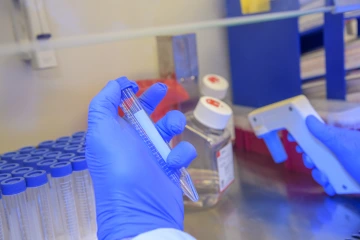
Creating sample collection kits involves adding the media that stores the sample to test tubes for specimen preservation, then adding the tube to a bio bag with cotton-tipped sample collection applicators.
The UArizona Health Sciences Biorepository developed the ability within just a few days, and spent the weekend producing 1,600 sample collection kits so people can be tested for the virus to help identify the spread and true community impact of the pandemic disease.
David Harris, PhD, MS, professor of immunobiology and director of the Biorepository, joined five other volunteers from his biorepository team for 35 hours this weekend to produce an initial 1,600 kits. Working the weekend was a sacrifice they willingly made to offset a shortage of kits and help the community understand the impact and reach of the virus here, he said.
“It wasn’t anything that we had to twist their arm to do, they were very willing to do it, they were asking,” Dr. Harris said. “That shows the excitement about the process and the commitment of doing something that has a real-life application.”
"It wouldn't be possible without volunteers' willingness to participate," Dr. Harris said.
The new kits are being distributed to University of Arizona Campus Health, throughout Southern Arizona to the Pima County Health Department, Banner – University Medical Center, and Carondelet Health Network, and in Northern Arizona to the Coconino County Health Department.
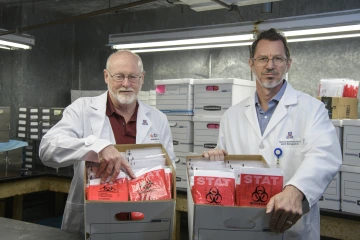
David Harris, PhD, MS, director of the University of Arizona Biorepository, and Michael Bawdowski, PhD, associate research scientist, hold boxes of COVID-19 sample collection kits ready for use in health care facilities.
“One of the core purposes of a high-quality research university is to ensure we are able to make material differences in our communities,” said Betsy Cantwell, PhD, University of Arizona senior vice president for research and innovation. “This pandemic tests all of our lives, and having the capacity to rapidly convert the amazing research capacities that we have at the University of Arizona into support for critical needs during this COVID-19 outbreak is exactly why we are here.”
Thousands More Sample Collection Kits For Testing
On Saturday and Sunday, researchers at the Biorepository in the College of Medicine — Tucson produced 1,600 COVID-19 specimen collection kits, and secured the materials to produce 5,000 kits per week. A significant shortage of collection kits nationally and regionally has limited the number of people tested for the virus.
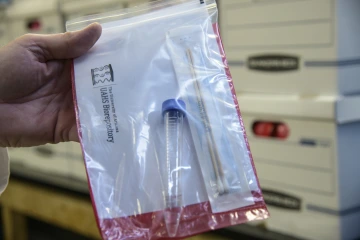
A completed COVID-19 sample collection kit.
"Fortunately, our personnel at the Biorepository has several decades of experience in creating biospecimen collection kits for use in FDA-approved analyses and clinical applications," said Dr. Harris, who was one of the first scientists to create cord blood stem cell collection kits that have become commonplace in most hospitals today.
A kit needs two critical components: a swab to collect the sample, and a medium to store the sample. The lack of those two components has created a bottleneck in widespread COVID-19 testing, Dr. Harris said.
Working from a formula provided by the CDC, scientists at the BIO5 Institute were able to create five liters of media. And now that the Biorepository holds sufficient supplies for the remaining components, the assembly line is in place.
Dr. Harris said the lab has more workers than space, because so many people want to help on the project, and everyone is keeping a safe distance from one another during the production process.
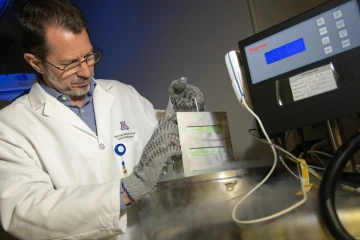
Michael Bawdowski, PhD, associate research scientist, adds specimens to a freezer to be stored for testing.
This ability to respond during a pandemic is a unique opportunity for medical researchers.
“Oftentimes doing research in the medical field can be fairly abstract. You can work for years and years on a question or a project without ever seeing how it’s going to be applied in real life,” Dr. Harris said. “This is one of the things where you know that if you can come up and make the kits, and make them in sufficient numbers, that there’s somebody standing outside the door waiting to take it off your hands and use it for testing.”
"Quite frankly, we’re not trying to develop anything novel or even particularly advanced,” said Ryan Sprissler, PhD, staff scientist and manager of the University of Arizona Genomics Core. “We’re trying to meet a critical need, which, right now, means making collection tests more readily available.”
Photo Gallery: COVID-19 Sample Collection Kits Made, Delivered to Hospital

